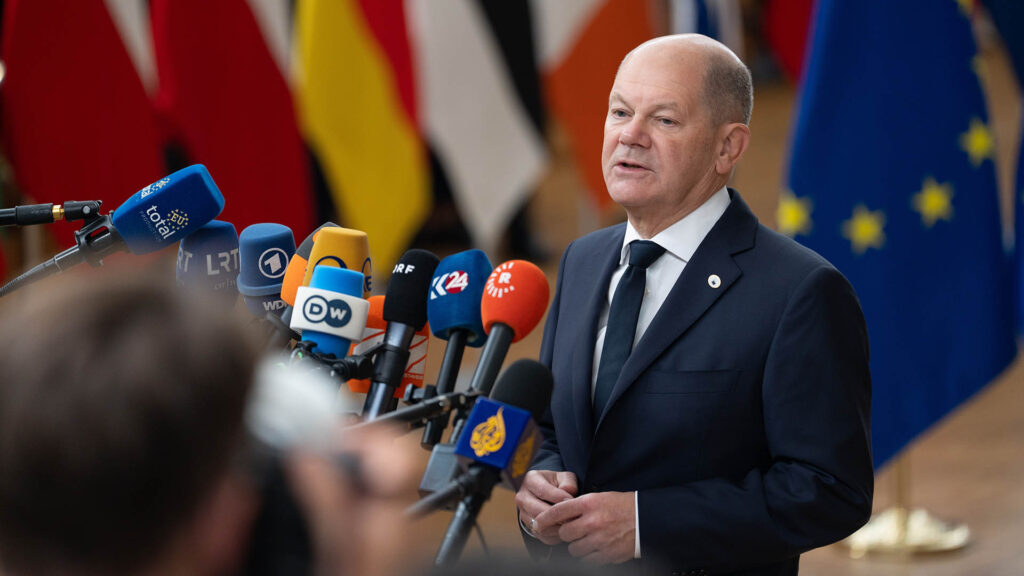German Chancellor Olaf Scholz has lost a no-confidence vote in the Bundestag.
The result comes after Scholz’s three-party coalition collapsed in November, leaving his administration as a minority government. The vote, which Scholz himself called, was seen as a tactical move to force early elections rather than waiting until the originally scheduled date in September 2025.
The no-confidence motion passed with 394 votes against Scholz, while 207 voted in his favour. 116 abstained. The outcome clears the way for Germany’s President Frank-Walter Steinmeier to dissolve parliament, which must now happen within 21 days, according to Germany’s constitution. A fresh national election is set for 23 February 2025.
Monday’s vote marks only the sixth time in post-war German history that a chancellor has faced a formal no-confidence vote, and it is only the fourth time a sitting chancellor has lost.
Germany’s DAX index closed 0.45% lower on the back of the instability.
Political gambit
Scholz had framed the no-confidence vote as a means to let voters “determine the political course of our country”. In a speech before the vote, he argued that Germany needed to “dare to be strong” and to “invest powerfully in our future”. He also pledged to push for “massive” investments in defence and infrastructure if re-elected.
Scholz’s critics described his move as a “kamikaze” strategy, with opposition politicians claiming he was gambling Germany’s political stability in a bid to salvage his party’s sagging popularity.
Coalition collapse
Scholz’s three-party coalition, which had included his Social Democratic Party (SPD), the Free Democratic Party (FDP), and the Green Party, fell apart in November after Scholz fired Finance Minister Christian Lindner, who leads the FDP.
In response, the FDP withdrew its remaining ministers. The government had been unable to agree on key issues like Germany’s 2025 federal budget and the handling of its constitutional “debt brake”, which limits borrowing.
The SPD and Greens have continued to govern as a de facto minority government, but without the parliamentary majority required to pass new laws.
The debt brake
The debt brake (Schuldenbremse) is a rule designed to limit the government’s ability to run structural budget deficits. It was introduced in 2009 as an amendment to Germany’s constitution (Grundgesetz) in response to the 2008 global financial crisis.
It’s one of the strictest fiscal rules in the world. Apart from extraordinary exceptions, the federal government is only allowed to run a structural deficit of 0.35% of GDP each year. For Germany’s 16 federal states (Länder), even stricter rules apply — they’re required to maintain balanced budgets with no structural deficits at all.
It would be difficult to amend, requiring a two-thirds parliamentary majority.
In November, the FDP refused to ease the debt brake for additional borrowing to fund infrastructure, climate action, social welfare, defence and support for Ukraine.
The SDP, in contrast, argued that the expenditure was necessary. They sought to use legal loopholes, reinterpretations, and creative accounting methods to work around the debt brake. For instance, they proposed classifying support for Ukraine as “extraordinary” and proposed excluding investment spending from the “structural deficit” calculation, similar to how certain “green investments” are excluded under EU fiscal rules.
Election campaign begins
With the February election now confirmed, Germany’s political parties have begun positioning themselves for a fierce campaign.
Scholz’s centre-left SPD will once again field him as their candidate for chancellor, despite the party’s declining popularity in recent polls. The FDP is hovering around the 4% threshold required to enter parliament.
The Greens have also seen their support fall.
Friedrich Merz, leader of the opposition Christian Democratic Union (CDU), is the frontrunner to succeed Scholz as chancellor. The CDU, along with its Bavarian affiliate, the Christian Social Union (CSU), is currently leading polls with around 33% support, well ahead of the SPD.
The far-right Alternative for Germany (AfD), currently polling at around 17%, is also expected to be a major player in the elections. While no mainstream party has indicated a willingness to form a coalition with the AfD, its rising vote share could complicate coalition-building.
Coalition possibilities
After the February elections, the CDU is the most likely to lead the next government, but it is likely that no party will hold a majority, meaning Germany will once again face complex coalition negotiations.
Merz has ruled out governing alongside the AfD, and potential coalitions with the SPD or the Greens would face significant ideological challenges. The FDP, meanwhile, may fail to cross the electoral threshold required for parliamentary entry, leaving fewer coalition partners available.

